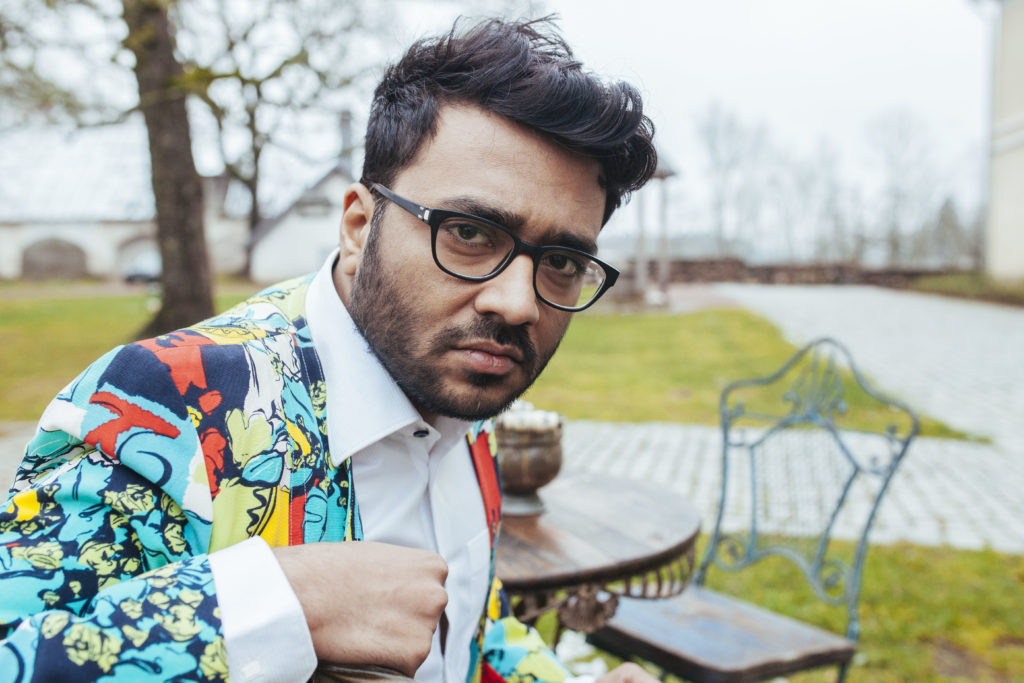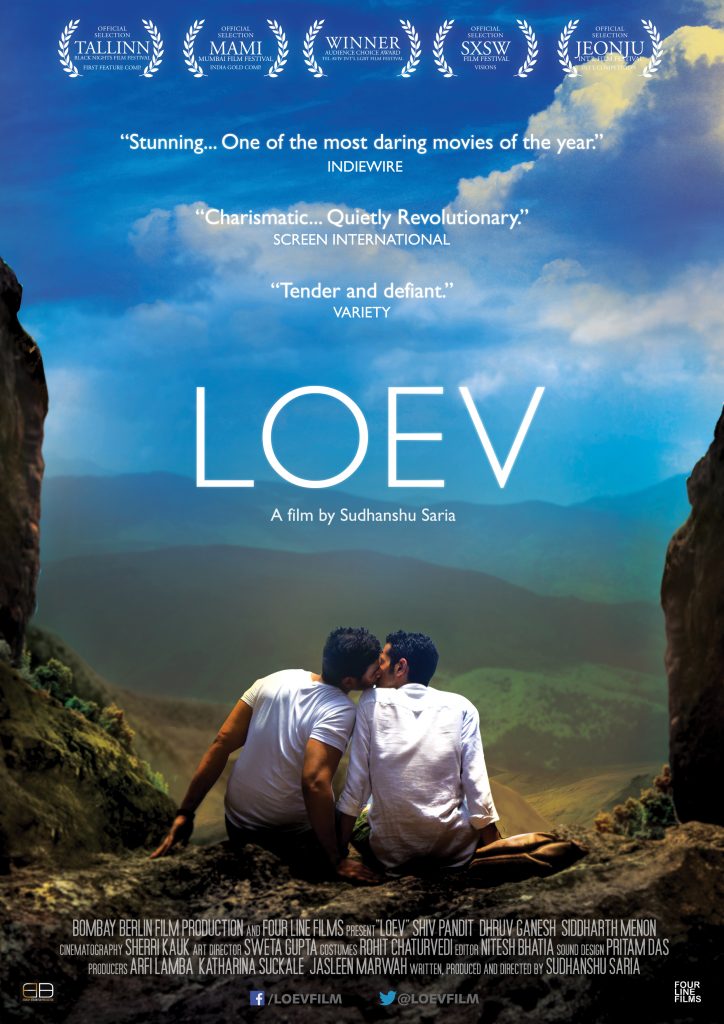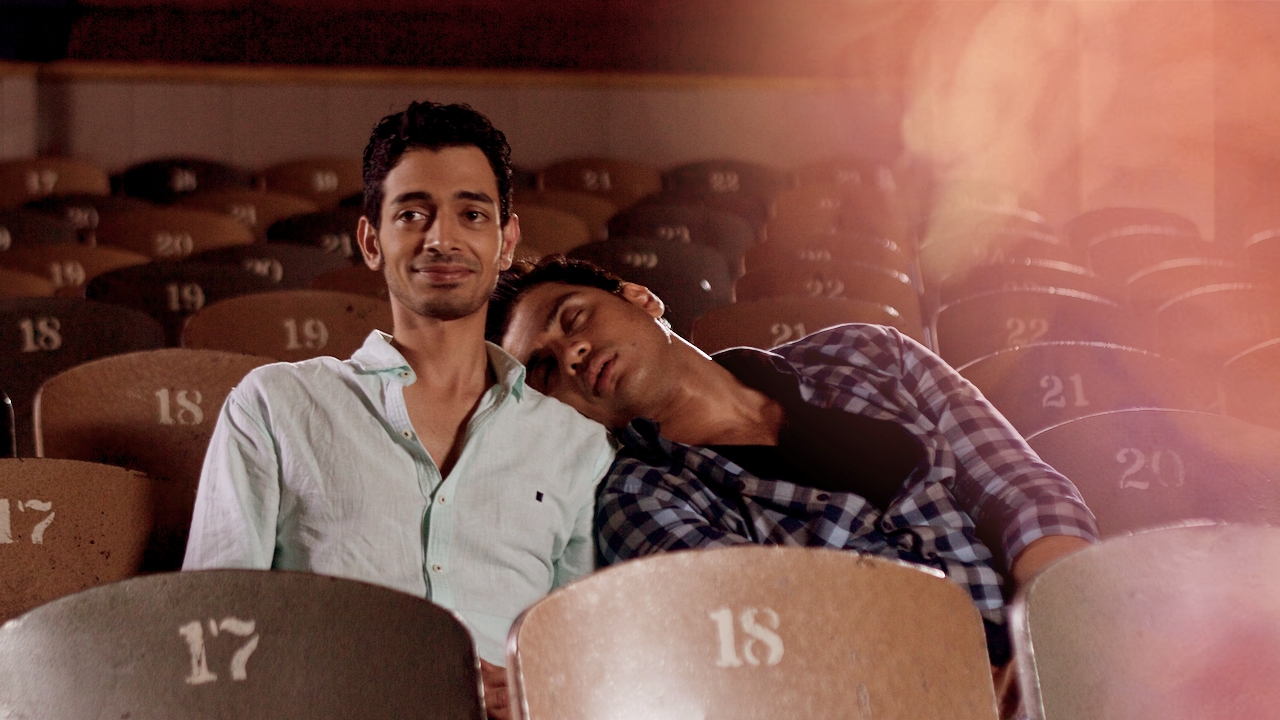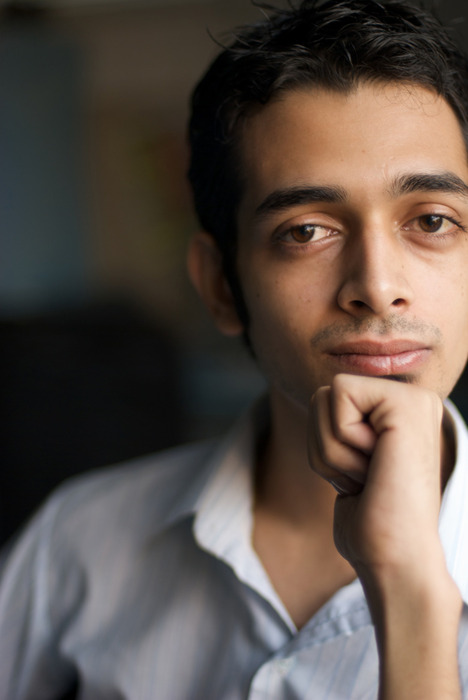Director Sushanshu Saria’s cinematic debut “Loev” won many accolades and hearts at the JIO MAMI 18th Mumbai Film Festival concluding today. Gaylaxy Magazine caught up with him for a frewheeling conversation about his labor of… well, loev.
Your film is atour de force that may verily represent a new era in cinematic representation of Indian LGBT life.
We focused on the dignity of love. That in itself, I believe, is radical, and very very political. In the movie, there is no morchabaazi or overt politics. We intentionally left out all mention of 377 and didn’t go down the route of conventional activism expected of the film. I wanted to reject the Government entirely. My interaction with LGBT people in Mumbai makes me feel that they are more interested in how and whom they’re going to go out with, how they’re going to be laid. So for me it was important to capture this reality, which is motivated and guided by the politics of love. How scary falling in love is, how scary holding on to it is; the excitement, the depression, the fun; male or female, hetero or homo!
The viewer, while riveted by the ebbs and flows of the attractions of the principal characters, seems to be kept just a tad at an arm’s length, evidenced in some of the edits where we don’t necessarily ‘end-scene’ out the dialogue. The viewer is left to make up his or her own mind about the characters. Tell us a little more about this aspect of the treatment of the film.
For me it was about trying to take a dispassionate view of the world. Not try to connect every emotional dot, so that you sort of stay disconnected, at a distance. So as an audience member, you’d want to lean in, rather than I as a film maker taking you by the hand on a sentimental journey, by way of, say, background music serving as a cue about what you are ‘supposed’ to feel.
Often in the film, the gayness of the characters almost seems to be an afterthought. The central axis is the interpersonal dynamic of the three protagonists rather than their homosexuality.
What we’re doing is a little bit of a heist. We have to trick audience members into relating to the characters, before we confront them with their sexual orientation. It’s not a problem when you’re speaking to the community or to someone who’s already progressive, sympathetic or an ally. But I was making this film for my aunt and uncle whom I lived with when I first came to Mumbai. They’re the nicest people on earth, but someone in the family would sometimes make the accidental homophobic joke without realizing it. So my thought was, if I start the film with two men making out – both the characters, Sahil and Alex are gorgeous and they’d look great doing it, this would give that audience member the chance to go – oh yeh hamari picture nahin hai – ‘this film is not ‘our kind of’ film’. The sexual orientation of the characters permeates into the story slowly. We had to be true to who these people are without putting in ‘cues’ by way of costume, etc.
What was your inspiration while writing the film?
I never thought the film would get made. So I was able to write very very honestly. I was going through some heartbreak – it was an unrequited love situation happening. Simultaneously, the political situation vis-a-vis gay rights was very much on the boil. So the two things sort of came together. It could have just as easily been a love triangle with a girl in the center.
By which you mean that there is a universality in the way we as humans handle love, irrespective of gender?
By making all three main characters men, each had equal power, emotional and physical. So their actions could be attributed to them, instead of to their gender. So nobody would say, as they do in a heterosexual binary: accha,‘she’s a girl so she did that’, or ‘he’s a guy so he did that’. We can judge them on an equal footing now. And so for me, making the three characters men was useful in that way.
The viewer remains in the dark about many of the markers that often characterize modern gay identity – closeted or out, straight-married or not, monogamous or in an open relationship.
As a viewer, if you come from a place where you think about my character that ‘he’s closeted’, or ‘he’s married’, I would never confirm or deny it. The script was the purest version of the film. I had the most time to get everything right. I expected it to be a complete disaster when it got into production. And it was. Two days into the shoot I wanted to end the whole thing. I really tried, but my producer wouldn’t let me shut it down. I felt, “My beautiful script will now be third-class movie. I might as well stop.” But later we started finding our groove. The highest compliment for me was when people who had heard the narration, said the film was like they heard it.
Dhruv Ganesh, who plays ‘Sahil’, was a bright young talent, who is sadly no more with us. Tell us a little bit more about him.
When I first saw him, I thought ‘No way!’. But the minute he picked up the script and started to read, it was magic, I just knew he was right. I didn’t care which character he played. For the longest time we didn’t know if Siddharth Menon (who played Alex) or Dhruv would play which character. Each had to learn the guitar and piano for a scene. Till two weeks before the shoot they didn’t know who was playing what. At some point they sat me down and said this needs an intervention. And so we arrived eventually at the present casting.
Dhruv had his own private process. Most of my work was with him in the workshop before we went to set. It was wonderful watching him create the part and lace it in with all the detail. My fondest memories are of him the person on the set – how considerate, generous, caring of everyone around he was. And on a film like this, where the resources are so few, you’re apologizing throughout the day for something or the other. So have people around you who take care of your crew, is a blessing. His performance, of course, is incredible. But even I don’t know if I understood that till I saw the film. He passed away from tuberculosis at age 29. We miss him terribly, and this film is dedicated to him.
One last question… why is the title spelt L-O-E-V, though pronounced as ‘love’,?
Visual representation is important. I want to say that ‘love’ does not always represent the conventional man-woman, Yash Chopra-style love. There are different types of love, between people of the same gender, and different identities that are frowned upon. But no matter how different their love may look like compared to convention, i.e. no matter how it is spelt, it is still love and deserves the same value!
- “Those Left Behind Things” – an ode to queer refugees - February 1, 2019
- Twilight, The Day Before - September 5, 2018
- “बुज़ुर्ग हैं, क्षीण नहीं” – “सीनेजर्स” वयस्क सम/उभय/अ लैंगिक पुरुषों का प्रेरणादायक संगठन - January 22, 2018





